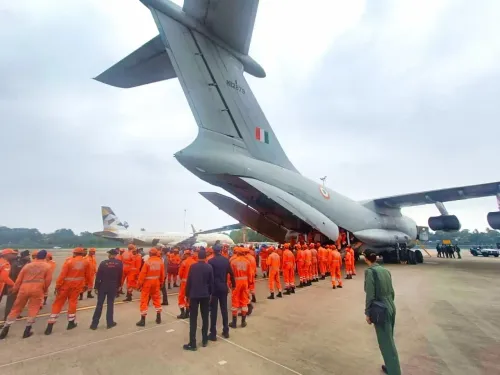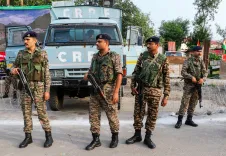Afghan Refugees Demand Immediate Cessation of Repressive Measures by Pakistani Law Enforcement

Synopsis
Key Takeaways
- Thousands of Afghan migrants are demanding an end to police actions.
- Recent arrests have raised concerns about safety and human rights.
- Many migrants face prolonged delays in resettlement to third countries.
- The situation has worsened since the Taliban regained control in 2021.
- UN agencies are urging Pakistan to protect Afghan nationals at risk.
Islamabad/Kabul, Feb 13 (NationPress) Thousands of Afghan refugees who have sought asylum in Pakistan are urging an immediate cessation of actions taken against them by police forces in Islamabad and Rawalpindi.
Recent reports from Afghan media have underscored the hardships faced by Afghan migrants, including numerous women and children, who are being apprehended by police across various cities in Pakistan and forcibly sent back to their homeland.
The Afghan community has also voiced concerns over the prolonged delays in processing applications for resettlement in third countries.
Having fled war and turmoil, Afghan migrants have taken refuge in Pakistan for decades. Since the Taliban regained control in 2021, millions of Afghans have sought safety in Pakistan due to fears of persecution.
By 2023, conditions for migrants worsened as Pakistani authorities resorted to abusive practices and mass deportations.
Following the order from former US President Donald Trump to halt the refugee program, the Pakistani government is now attempting to relocate registered Afghan refugees from Islamabad and Rawalpindi back to Afghanistan.
The Afghan embassy in Pakistan recently reported the detention of nearly 800 Afghan nationals in Islamabad.
Sardar Ahmad Shakeeb, the Acting Ambassador of Afghanistan to Pakistan, indicated that Afghan citizens, even those holding valid visas and residency permits, have been apprehended by Pakistani police.
"The detained individuals number between 700 and 800. Some were taken from their residences and relocated to a facility notorious for deporting Afghans," Shakeeb informed TOLOnews, a prominent Afghan media outlet.
Earlier this month, the United Nations High Commissioner for Refugees (UNHCR) and the International Organisation for Migration (IOM) expressed their concerns regarding the recent demands for Afghan nationals in Pakistan to vacate the Islamabad Capital Territory (ICT) and Rawalpindi or face deportation. The agencies sought clarification on the methods and timelines for this relocation.
Both organizations noted a significant rise in the arrest of Afghan nationals in ICT and Rawalpindi since January, causing great distress, with reports indicating that Afghan individuals of various documentation statuses are being rounded up.
"Forced repatriation to Afghanistan could expose many individuals to heightened risks. We urge Pakistan to continue safeguarding Afghans at risk, regardless of their documentation status," stated Philippa Candler, the UNHCR representative in Pakistan.










